Mysterious Space Rock Crashes Through Home Roof, Lands in Bedroom, Still Warm
Woman gets a shocking gift from space when she discovers a meteorite in her home.
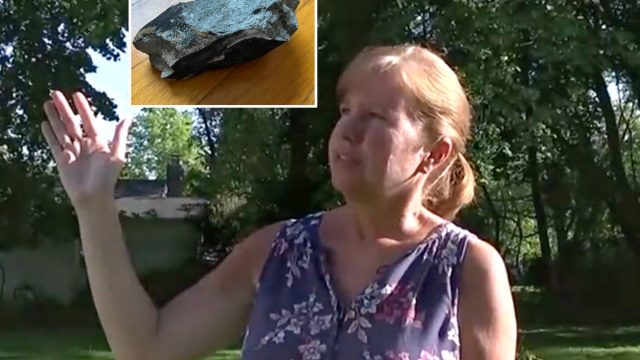
A New Jersey woman came home to find what she initially thought was a rock thrown through her roof, but it was actually a meteorite. The potato-sized shiny black object smashed through the home of Suzy Kop, who was shocked to find the rock still warm in her Hopewell Township house. According to CBS News Philadelphia, “Authorities said the object is about 4 inches by 6 inches. It’s an oblong shape and appears metallic.” No injuries were reported and nobody was home at the time of the incident.
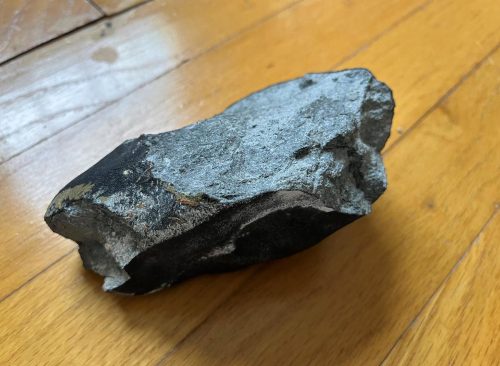
As the rock punched through the ceiling of the home, it did cause damage, which Kop showed CBS News Philadelphia. “We are thinking it’s a meteorite, came through here, hit the floor here because that’s completely damaged, it ricocheted up to this part of the ceiling and then finally rested on the floor there,” Kop said. “I did touch the thing because it thought it was a random rock, I don’t know, and it was warm.”

Kop and her family thought the bizarre happening should be reported. They contacted the non-emergency police line, which they said was an “interesting” call as they explained something from space landed in their home. “It appears whatever came from the sky fell through the roof of the top window that’s my dad’s bedroom,” Kop said.

Since Kop touched the metallic shiny meteorite and others were exposed to the rock, the family was tested for radioactive residue. “They were afraid that, you know, because it fell from the sky, was it radioactive? Could we have a type of residue on us? So they scanned us and everything came back clear,” Kop said. “I thank God that my father was not here, no one was here, we weren’t hurt or anything,” she added.

There’s a lot of buzz about the meteorite and one expert believes it could be four to five billion years old and left over from the beginning of the solar system. Derrick Pitts, the chief astronomer at the Franklin Institute, told CBS News Philadelphia “It’s been running around in space all that time and now it’s come to Earth and fell in their laps,” Pitts said. “For it to actually strike a house, for people to be able to pick up, that’s really unusual and has happened very few times in history.”
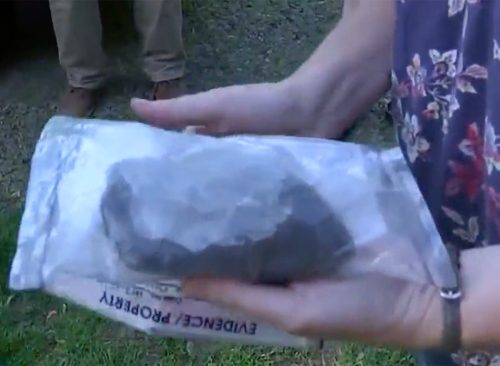
According to NASA, “A meteoroid that survives its passage through the Earth’s atmosphere and lands upon the Earth’s surface.” About once a year a car-sized “asteroid hits Earth’s atmosphere, creates an impressive fireball, and burns up before reaching the surface.” However, every 2,000 years a meteoroid the size of a football field crashes down on Earth, causing significant damage. NASA also states that, “once every few million years, an object large enough to threaten Earth’s civilization comes along. Impact craters on Earth, the moon and other planetary bodies are evidence of these occurrences.”
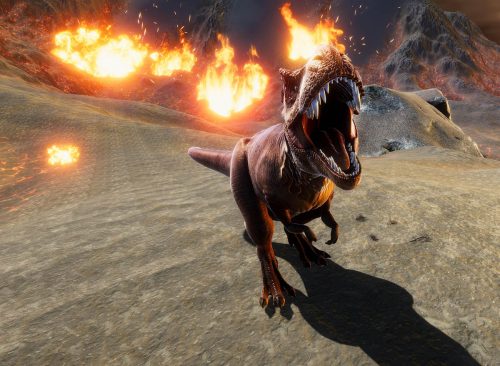
In an interview not regarding the New Jersey meteorite discovery, Astrophysicist Neil Degrasse Tyson told CBS Morning News that officials should discuss how to combat asteroids. “We’ve always known we don’t want to get hit,’ Tyson said. ‘We’ve been hit – and let’s talk to the dinosaurs about what happens when you get hit. The dinosaurs were taken out by an asteroid the size of Mt. Everest 65 million years ago.” He continued, ” We remember the dinosaurs because they have big teeth and they are ferocious – but few people think about that 70 percent of all the world’s species – of life – went extinct in that very same episode.” He added, “Little ones can come, and maybe we won’t go extinct, but it can take out our grid, and we might have to jump-start civilization.”
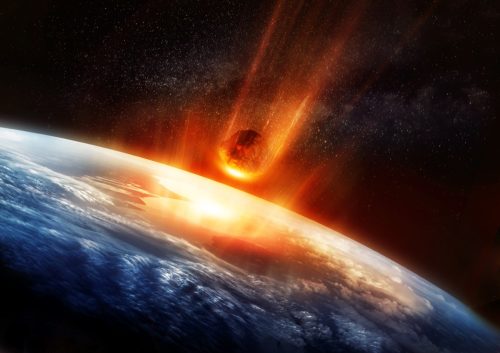
The Astrophysicist called the operation to stop asteroids ‘the most expensive mission’ and said if a big asteroid was heading to Earth in our lifetime, we may only get three months warning, “so you need something ready to go.” He also explained why blowing up a large asteroid isn’t the best solution. “While we’re going at blowing things up, we’re less good at knowing where the pieces will fall afterwards. You don’t want to take one asteroid and turn it into two and then you have to evacuate two coastlines.” He added, “Right now the odds on favorite is the effort to deflect an asteroid out of harm’s way. it still lives to hurt you on another day, but once you can start maneuvering where things are in the solar system, you’re done. You’ve assured your survival for millions of years to come.”














